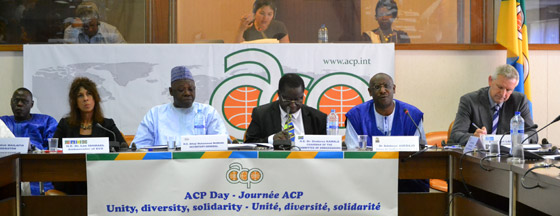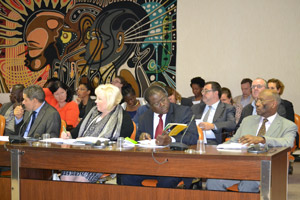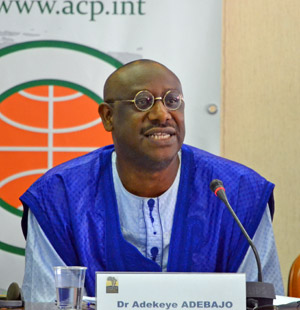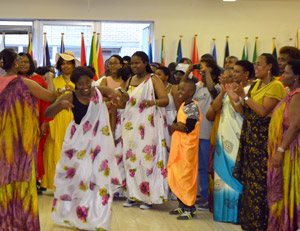Roundtable interrogates the ACP-EU partnership and its role in global governance

Brussels, 11 June 2014/ ACP: Frank, open critiques of the ACP-EU relationship and ACP Group, as well as constructive proposals on how to enhance their relevance in global affairs were the highlight of a stimulating and provocative debate held at the ACP House on Friday 6th June.
The roundtable seminar, based on the topic “The Challenges of Global Governance and the Emerging World Order: What role for the ACP-EU partnership?” was part of a special programme for ‘ACP Day’ to commemorate the founding of the ACP Group as an institution in 1975.
Invited speakers included the Director of the Centre for Conflict Resolution in Capetown, South Africa Dr Adekeye Adebajo, a leading authority in African international affairs; former Director General of the Organisation of Eastern Caribbean States (OECS) and current Ambassador of the Easter Caribbean States to the European Union H.E Dr Len Ishmael; and Deputy Director of Maastricht-based independent think tank known as the European Centre for Development Policy Management (ECDPM) Mr. Geert Laporte.
In his introductory remarks, ACP Secretary General H.E Alhaji Muhammad Mumuni set the scene by reminding the meeting that the ACP Group is the largest trans-hemispheric international organization in the world, and its partnership with the EU is a classic model of North-South cooperation for development. (Read the Secretary General's full statement)
“As we face a New Europe, with its changing geopolitical priorities and the emergence of new powers in Asia and Latin America, it is imperative that we explore how we can forge a stronger and more enduring partnership,” he said.
Desirability vs. feasibility 
EU development policy expert Mr. Geert Laporte insisted on the need for a “reality check” and focused on the “desirability versus feasibility” of renewed ACP-EU partnership as well as having the ACP alliance itself. (Download Mr Laporte's full presentation)
“Wordings such as ‘shared interests’, ‘solidarity’, ‘unique partnership’ reappear regularly in … statements. But at some stage, these risk to become hollowed slogans that are not always sustained by concrete evidence,” he asserted.
Mr Laporte pointed to an alleged “decline” of the importance of the ACP-EU framework in global governance, saying that at a political level, public goods such as democracy, human rights, and peace and security are primarily addressed through other fora such as the African Union and its instruments. Trade is mostly dealt with on a regional basis through the Regional Economic Communities and organisations.
Mr Laporte urged more “realistic” discussions and stronger internal coherence within the ACP Group. He said to remain relevant, the ACP should reduce its mandate and focus only on those areas where it can bring added value, such as the Blue Economy, mobilise its own financial means beyond European aid, and ensure that the institution has presence and visibility outside of Brussels.
Global governance & global apartheid 
Taking a very different outlook, Dr Adebajo addressed global governance through a historical geopolitical lens, citing neo-colonialism and “global apartheid” as key challenges. (Download Dr Adebajo's full presentation)
Using the three pillars of the Cotonou Agreement framework – trade, development cooperation and political dialogue – Dr Adebajo illustrated how the global system is dominated by the rich Northern hemisphere, mainly Europe and the United States, divided sharply from the world of the poorer Global South, including the ACP regions.
To improve the context of ACP-EU relations, and global governance in general, Dr Adebajo called for a stop to the “begging bowl culture and addiction to EDF funds”, referring to the high dependence of ACP on EU aid. He highlighted instead examples of interdependency between the two parties, adding that cooperation is indeed possible, but on modified terms.
He said ACP regions should share and learn from best practices from their respective experiences with EPA negotiations, and that the EU should pay compensation to ACP states for its “harmful CAP [Common Agricultural Policy] subsidies”, which boost European farmers competing in the same market as disadvantaged ACP farmers.
He criticized the “Brussels bubble” in which much of the discussions about the ACP Group’s future has been taking place, and urged more involvement of ACP civil society and private sector actors. He also advocated the engagement of ACP-based think tanks and researchers rather than turning to European institutions for these services.
“Brussels will almost certainly pursue separate relationships with each of the ACP regions after Cotonou expires in 2020, so I think we should prepare for that,” he warned, adding that in “outsourcing” the ACP-EU relationship to be dealt primarily through the EU Commission signaled a downgrading of the partnership, and that European governments were essentially turning away from their responsibility as partners in the framework.
Mutual respect 
Ambassador Ishmael offered a more affirmative outlook, as she acknowledged the significantly transformed landscape of international relations, since the beginnings of the ACP-EU partnership. (Download Dr Ishmael's full presentation)
She said the developing world must take on a “shared vision for the future” in order better frame a partnership with the EU based on greater equality. This would also provide a solid platform to engage in the international fora with one respected voice on matters of global governance and development.
“There is every reason to be confident that a partnership that has outlived many marriages will find a way to refashion a strong and durable partnership…. The ACP has provided a platform through which the EU has extended the scope of its geographic, economic, and geostrategic reach. And the Partnership has unlocked very important resources for the development of ACP member states…
“Only through forging a relationship based on mutual respect, dignity and understanding, can it become a credible voice in tackling some of the thorniest of global governance issues,” she told participants.
The Chair of the Committee of Ambassadors, H.E Dr Diodorus Kamala further supported continued and enhanced partnership amongst ACP members states as a Group, and between the ACP Group and the European Union, insisting that “united we stand, divided we fall”. (Read the Chair's full statement)
Presentations by the speakers stimulated an active debate with the audience. Following the seminar, guests enjoyed a banquet of African, Caribbean and Pacific foods, cultural performances and displays.
Statements/ Presentations
ACP Secretary General – Mr. Alhaji Muhammad Mumuni
Chair of the ACP Committee of Ambassadors – Dr. Diodorus Kamala
Photo galleries
Roundtable Seminar(Photos by Betty Dodd)
Cultural Evening(Photos by Mathieu Lawson)
– ACP Press
